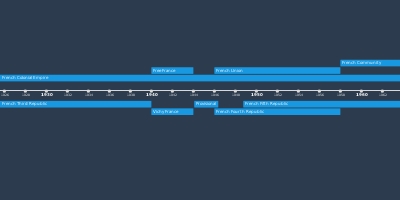Charles Maurice de Talleyrand-Périgord (1 Apr 1814 Jahr – 2 Mai 1814 Jahr)
Beschreibung:
When Napoleon was succeeded by Louis XVIII in April 1814, Talleyrand was one of the key agents of the restoration of the House of Bourbon, although he opposed the new legislation of Louis's rule. Talleyrand was the chief French negotiator at the Congress of Vienna; earlier that same year he signed the Treaty of Paris. It was due in part to his skills that the terms of the treaty were remarkably lenient towards France. As the Congress opened, the right to make decisions was restricted to four countries: Austria, the United Kingdom, Prussia and Russia. France and other European countries were invited to attend, but were not allowed to influence the process. Talleyrand promptly became the champion of the small countries and demanded admission into the ranks of the decision-making process. The four powers admitted France and Spain to the decision-making backrooms of the conference after a good deal of diplomatic maneuvering by Talleyrand, who had the support of the Spanish representative, Pedro Gómez Labrador, Marquis of Labrador. Spain was excluded after a while (a result of both the Marquis of Labrador's incompetence as well as the quixotic nature of Spain's agenda), but France (Talleyrand) was allowed to participate until the end. Russia and Prussia sought to enlarge their territory at the Congress. Russia demanded annexation of Poland (already occupied by Russian troops); this demand was finally satisfied, despite protests by France, Austria and the United Kingdom. Austria was afraid of future conflicts with Russia or Prussia and the United Kingdom was opposed to their expansion as well—and Talleyrand managed to take advantage of these contradictions within the former anti-French coalition. On 3 January 1815, a secret treaty was signed by France's Talleyrand, Austria's Metternich and Britain's Castlereagh. By this tract, officially a secret treaty of defensive alliance, the three powers agreed to use force if necessary to "repulse aggression" (of Russia and Prussia) and to protect the "state of security and independence."Talleyrand, having managed to establish a middle position, received some favours from the other countries in exchange for his support: France returned to its 1792 boundaries without reparations, with French control over the papal Comtat Venaissin, County of Montbéliard and Salm, which had been independent at the start of the French Revolution in 1789. It would later be debated which outcome would have been better for France: allowing Prussia to annex all of Saxony (Talleyrand ensured that only part of the kingdom would be annexed) or the Rhine provinces. The first option would have kept Prussia farther away from France, but would have needed much more opposition as well. Some historians have argued that Talleyrand's diplomacy wound up establishing the faultlines of World War I, especially as it allowed Prussia to engulf small German states west of the Rhine. This simultaneously placed the Prussian Army at the French-German frontier, for the first time; made Prussia the largest German power in terms of territory, population and the industry of the Ruhr and Rhineland; and eventually helped pave the way to German unification under the Prussian throne. However, at the time Talleyrand's diplomacy was regarded as successful, as it removed the threat of France being partitioned by the victors. Talleyrand also managed to strengthen his own position in France (ultraroyalists had disapproved of the presence of a former "revolutionary" and "murderer of the Duke d'Enghien" in the royal cabinet).
Zugefügt zum Band der Zeit:
Datum:
1 Apr 1814 Jahr
2 Mai 1814 Jahr
~ 1 months
